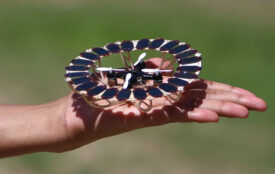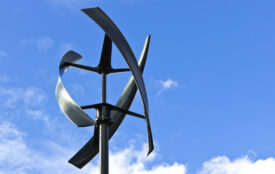Advancing the energy transition with artificial intelligence
The startup suena has developed a key technology for the energy transition and wants to revolutionize the storage of electricity with artificial intelligence. TU Hamburg start-up suena receives million investment.
The idea for the start-up originated at the Technical University of Hamburg and was further developed with the support of Startup Dock, the TU Hamburg’s start-up center, and beyourpilot. Following an EXIST startup grant and funding from IFB Hamburg’s InnoRampUp, the startup was able to close its pre-seed financing round by raising around 1.2 million.
At TU Hamburg, the founders conducted intensive research on the system integration of stationary large-scale battery storage systems to support grid operations and developed methods, algorithms and models that enable operators and energy storage companies to maximize and stabilize their revenues in the short-term electricity and balancing power markets. In the latest round of funding, the founders were able to convince investors with an AI-based software that has the potential to promote the expansion of energy storage and renewable energies and drastically accelerate the energy transition.
Science Senator Katharina Fegebank: “It is something special when a start-up collects so much money in the concept phase. The founders can only be congratulated on this! This early success shows that tech-based solutions to accelerate the energy transition are emerging in Hamburg because we have bright minds and a functioning innovation and ecosystem at our universities, and the various government funding programs at both the federal and state levels are interlocking and being used in a targeted manner.”
Senator for Economic Affairs Michael Westhagemann: “Decentralized electricity storage plays a crucial role in the implementation of the energy transition. The founders have impressively succeeded in developing an innovative AI-based application for energy storage systems and have already convinced many companies of this. We need such pioneers with smart ideas in Hamburg and support them in successfully establishing their innovations on the market. We have already been able to effectively support the startup’s seed phase with the central “InnoRamp” funding program of Investitions- und Förderbank Hamburg. I am pleased that the founders have now succeeded in attracting additional investors for the further development process and wish them every success in this endeavor.
University President Prof. Dr. Timm-Giel: “TU Hamburg is committed to technology for people. Technological solutions for mitigating climate change and its consequences are therefore important to us. We bring them to the economy and society through our research results, graduates and spin-offs. Therefore, we are very pleased that suena has successfully launched with the support of our Startup Dock and beyourpilot. For the funding we congratulate very warmly and wish much success!”
suena – Sustainable Energy Applications
“Intelligently equipped large-scale energy storage systems are crucial to making the energy transition possible. Because unlike coal-fired power plants, renewable energy sources are weather-dependent and their yields are difficult to predict,” says Dr. Lennard Wilkening, one of the founders of suena. Together with Miguel Wesselmann and Tom Witter, they came up with the idea of improving the use of storage facilities and the marketing of stored energy. A project that above all gives plant operators financial planning security.
Higher economic efficiency through better forecasts
The question is how to use the energy of the storages in such an optimal way that the economic advantage grows. “Since performance is defined by the software, the better the software, the higher the profits,” concludes Miguel Wesselmann. The startup has therefore linked various parameters, such as weather and electricity market price forecasts, as well as storage aging. “In this way, we can use our software to look a day into the future every quarter of an hour, control the state of charge depending on wind and solar plants, and make optimal use of their storage,” explains Tom Witter, a computer science engineer responsible for programming. Another advantage of the software is its multi-use approach, which allows the storage unit to be used for different applications in parallel. This means that, in addition to being marketed on the electricity market exchange, the electricity can also be offered on other markets, such as the balancing power market, where grid operators purchase energy on demand and electricity producers submit bids. This gives plant operators different sources of revenue and less risk. “At the moment, there is a lot of uncertainty in the renewable energy markets. The software can limit this: We optimize the integration of renewable energy so that profits become more stable,” says Dr. Lennard Wilkening.
About the founders
Dr. Lennard Wilkening holds a PhD from the Institute of Electrical Power Engineering at the Technical University of Hamburg. During his research, he met Miguel Wesselmann, who completed his bachelor’s and master’s degrees in mechatronics at the TU Hamburg and in parallel completed a master’s degree at the NIT in Technology Management with a focus on entrepreneurship. Tom Witter brings the necessary knowledge for programming. During his computational engineering science studies at RWTH Aachen University, he specialized primarily in artificial intelligence.
About Startup Dock & beyourpilot
Startup Dock, the startup center of the TU Hamburg, together with the two startup university alliances beyourpilot and Startup Port, offers students, researchers and graduates interested in founding a company a comprehensive range of support services for the early phase of company formation. beyourpilot is funded by the Hamburg Ministry of Economics and Innovation and supports budding entrepreneurs with startup advice, online resources and workshops. The portfolio of services offered by the Startup Port network, which is funded by the German Federal Ministry of Economics and Climate Protection, meanwhile includes a certificate program to accompany studies, a program to boost entrepreneurial self-confidence, an incubator for sustainable business ideas, an academy for startup advisors, as well as formats for networking startups with companies and formats for finding co-founders. All offers are free of charge for university members.
Further information at: https://suena.energy/ and https://startupdock.de/








